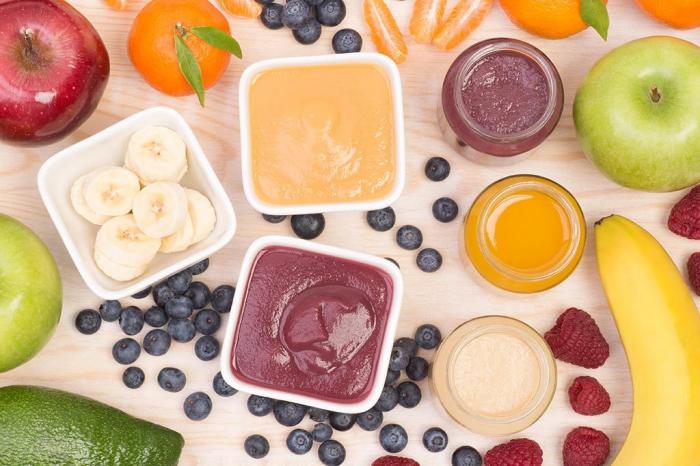Introducing solid foods to your baby is an exciting milestone. Many parents wonder what purees to start with at around 4 months. This article will guide you through the best options, preparation tips, and signs to look for when starting your baby on purees.
When to Start Purees
Most pediatricians recommend starting solid foods at about 4 to 6 months. Before introducing purees, ensure your baby shows signs of readiness. These signs include:
Sitting up with support.
Showing interest in food.
Good head and neck control.
Losing the tongue-thrust reflex.
If your baby meets these criteria, it may be time to start purees.
Benefits of Starting Purees Early
Starting purees at 4 months can help your baby develop their taste buds. It introduces new flavors and textures. Early exposure to a variety of foods may also help reduce the risk of allergies later on. Purees can also provide essential nutrients that support your baby’s growth and development.
Choosing the Right Purees
When starting with purees, it’s essential to choose foods that are gentle on your baby’s digestive system. Here are some great options to consider:
1. Single-Grain Cereals
Rice cereal is a popular choice for many parents. It is easy to digest and often fortified with iron. You can mix it with breast milk or formula to achieve a smooth consistency. Start with one to two teaspoons and gradually increase as your baby gets used to it.
2. Applesauce
Applesauce is naturally sweet and full of vitamins. Peel and cook apples until soft, then mash or blend them until smooth. Ensure there are no added sugars. Start with a small spoonful and watch your baby’s reaction.
3. Pear Puree
Pears are soft and easy to digest. They have a mild flavor that many babies enjoy. Peel, core, and steam the pears until soft. Blend them until smooth. This puree is a great option to offer alongside applesauce.
4. Avocado Puree
Avocados are rich in healthy fats and nutrients. They are also creamy and easy to prepare. Simply mash a ripe avocado with a fork or blend it until smooth. You can add a little breast milk or formula to thin it out if needed.
5. Sweet Potato Puree
Sweet potatoes are a nutritious choice, packed with vitamins A and C. Peel, cube, and steam the sweet potatoes until soft. Blend them with a little water or breast milk to achieve a smooth texture. The natural sweetness makes it appealing to babies.
6. Carrot Puree
Carrots are rich in beta-carotene, which is beneficial for vision and immunity. Peel and chop the carrots, then steam them until tender. Blend until smooth, adding water or breast milk for a thinner consistency.
7. Banana Puree
Bananas are soft and easy to mash. They are also a great source of potassium. Simply peel a ripe banana and mash it with a fork or blend it until smooth. This puree is simple and nutritious.
Tips for Preparing Purees
When preparing purees, follow these tips for safety and nutrition:
Wash and Peel: Always wash fruits and vegetables thoroughly. Peel them if necessary to remove pesticides or wax.
Cook Thoroughly: Steam or cook the fruits and vegetables until they are soft. This makes them easier to puree.
Blend Smoothly: Use a blender or food processor to achieve a smooth texture. You can add water, breast milk, or formula to help with consistency.
Cool Before Serving: Allow purees to cool before feeding them to your baby. Test the temperature to avoid burns.
Store Safely: If you make large batches, store purees in airtight containers. You can freeze them in ice cube trays for easy portioning.
Introducing New Foods
When introducing new purees, it’s essential to do so one at a time. Wait three to five days between each new food. This practice helps you monitor for any allergic reactions. Common signs of allergies include:
Rash or hives.
Diarrhea or vomiting.
Swelling around the mouth or face.
If you notice any of these symptoms, consult your pediatrician.
Feeding Techniques
Feeding your baby purees can be a delightful experience. Here are some techniques to make it enjoyable:
Use a Soft Spoon: A soft-tipped spoon is gentle on your baby’s gums.
Small Amounts: Start with small spoonfuls. Allow your baby to explore the texture and taste.
Patience is Key: Your baby may take time to adjust to new flavors. Be patient and encouraging.
Make it Fun: Engage with your baby during feeding. Smile and talk to them. This interaction makes mealtime enjoyable.
Watch for Readiness Signs
As your baby grows, they will show signs of readiness for more variety. Look for cues that they are ready for different purees or textures:
They can sit up with minimal support.
They show interest in your food.
They can move food to the back of their mouth.
When your baby shows these signs, you can start introducing more complex purees and even soft finger foods.
Safety Considerations
When starting purees, safety is essential. Always supervise your baby during feeding. Never leave them unattended. If your baby chokes or has difficulty swallowing, stay calm and follow proper first aid procedures.
Be aware of choking hazards as your baby grows. Avoid whole nuts, popcorn, or hard candies. Cut food into small pieces to reduce the risk of choking.
See also: Can You Jar Homemade Baby Food
Conclusion
Starting purees at 4 months can be an exciting journey for both you and your baby. Choosing the right foods, preparing them safely, and observing your baby’s readiness are key steps in this process.
Begin with simple, single-ingredient purees like rice cereal, applesauce, and avocado. Introduce new foods one at a time, and wait for signs of allergies. Make feeding a fun and engaging experience.
As your baby grows, they will show readiness for more complex flavors and textures. Always prioritize safety and monitor your baby’s reactions. Enjoy this special time as you explore new tastes together!
Related topics:


